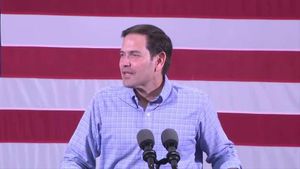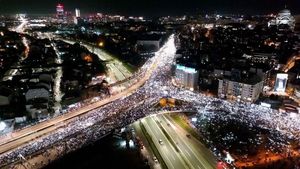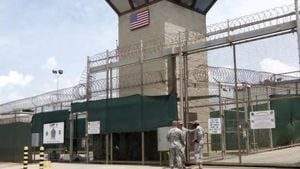South Korea is facing unprecedented political turmoil as President Yoon Suk Yeol finds himself at the center of impeachment proceedings and criminal investigations rooted in his controversial martial law declaration.
Yoon was impeached by the National Assembly on December 3, 2023, becoming the first sitting South Korean president to be detained under such circumstances. His arrest stems from allegations of insurrection as he ordered martial law—a move swiftly overturned by parliament.
Just recently, prosecutors sought to extend Yoon's detention as they probe these serious allegations. Initial requests to extend have been met with resistance; the Seoul Central District Court rejected prosecution's plea on the grounds of insufficient reasons, raising questions about the effectiveness of the Corruption Investigation Office (CIO) earlier investigations.
The court remarked on the previous investigations conducted by the CIO, indicating their findings were not substantiated enough to justify the extension of detaining Yoon. They cited the need for substantial evidence and clarity on procedural rights, stating, "The court has confirmed the CIO’s investigation was flawed from the beginning," echoing sentiments from the ruling People Power Party (PPP).
Yoon's attorneys responded positively to this decision. They argued, "The Seoul Central District Prosecutors’ Office has no grounds to conduct supplementary investigations following the CIO’s probe," underscoring their belief in Yoon's lawful standing. The PPP, rallying behind its leader, called for his immediate release following the court's dismissal.
Despite the court ruling, the legal pressure continues to mount. Following the court decision, prosecution officials announced their intention to prepare for Yoon’s indictment should the judicial body deny their second request for his detention extension. One official hinted at the precarious state of the investigation, asserting, "We are reviewing all possible options as the outcome remains uncertain." This uncertainty hangs heavily over Yoon and the political climate of South Korea.
Currently detained at the Seoul Detention Center, located south of the capital, Yoon's condition has drawn some concern. His lawyer stated, "He is doing well,” but noted, "a little uncomfortable," as he remains isolated amid his constraints. Interestingly, as the investigation unfolded, Yoon has exercised his right to remain silent and has reportedly refused to engage with questioning officials, which has sparked debates about his next steps.
Even with the turmoil, Yoon has remained composed, contributing to discussions about his power and influence as the nation wrestles with its next political steps. The CIO has expressed its frustration, with one official commenting on Yoon’s non-cooperation: "The president did not invoke his right to remain silent... He simply refused to speak." This behavior has lessened public confidence and intensified scrutiny over his leadership.
Adding to the climate are the reactions from the political opposition, particularly the main opposition Democratic Party (DP). They have called upon the prosecution to expedite the process of Yoon's indictment, asserting the need for swift action to restore faith among the electorate. These developments underline the gravity of the situation, as each political move and legal decision can significantly sway public opinion.
Yoon's situation reflects broader societal tensions and the growing divide between South Korea's political factions. Support for the impeached president is still apparent, as seen during recent rallies where his supporters gathered to voice their discontent with the proceedings. The stark divisions reveal regional divides and differing perceptions about his leadership and accountability.
The coming days are likely to prove pivotal for Yoon as he navigates the complex web of legal, political, and public arenas demanding accountability. The combination of impeachment proceedings and criminal investigations reinforces the contentious nature of South Korean politics, highlighting the continuous struggle for balance between authority and legislation.
With the Constitutional Court's trial on the horizon, it remains uncertain whether Yoon will be allowed to return to office or face permanent suspension from his powers. South Korea's political future teeters on this verdict, and it is clear all eyes are fixed on the outcomes of these proceedings.



